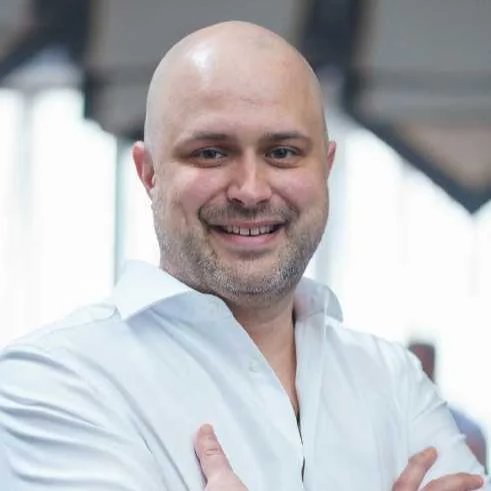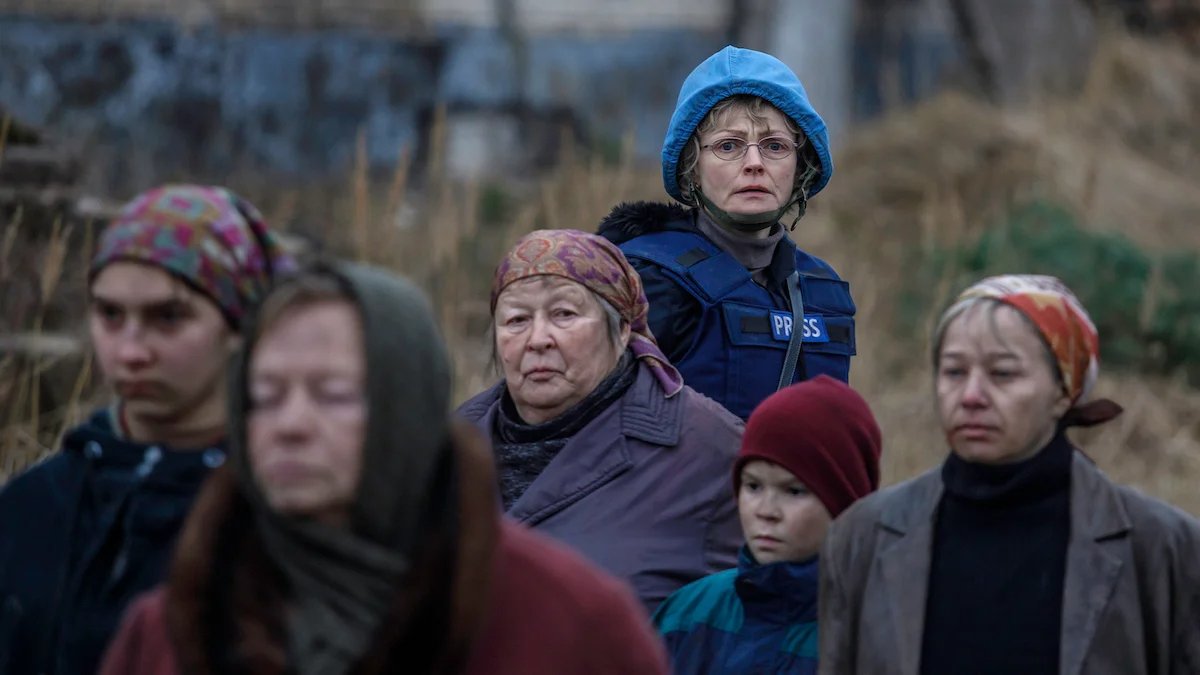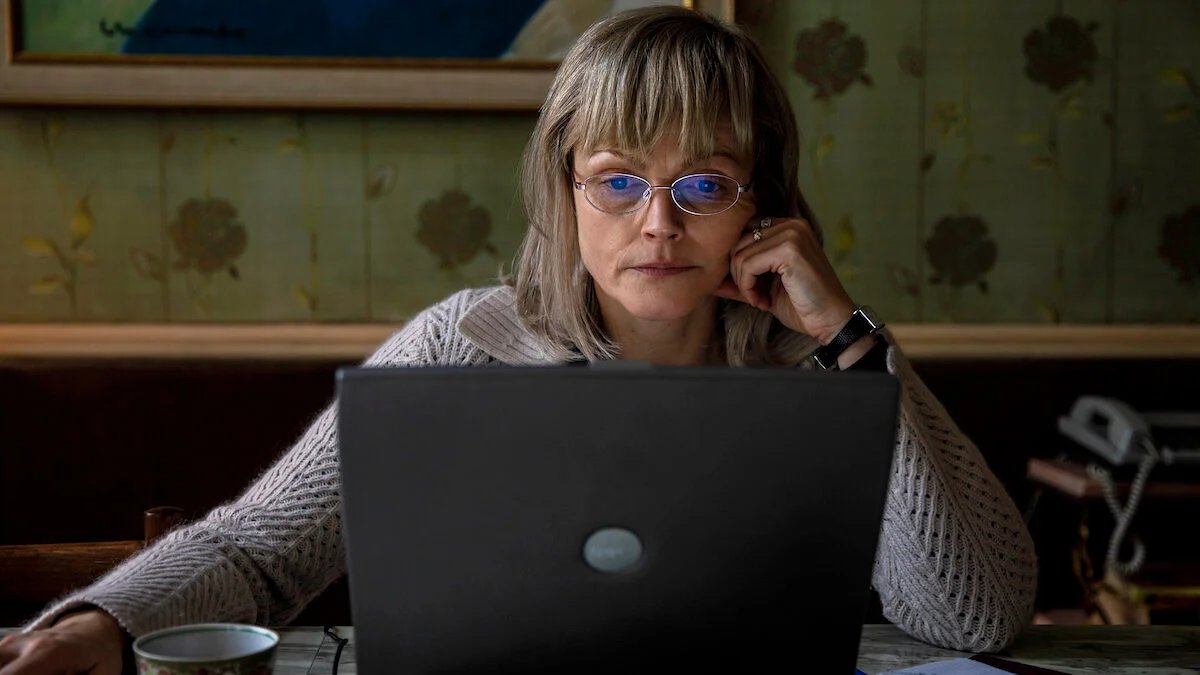



Words of War, the first feature film about Novaya Gazeta journalist Anna Politkovskaya, who was gunned down in the entrance to her Moscow home in 2006, was released in the United States just ahead of World Press Freedom Day earlier this month. The film, shot in English in Latvia, stars famous British actors, with Sean Penn one of the producers.
Waking up in hospital after being poisoned on a plane on the way to Beslan in the North Caucasus in an attempt to help solve a school hostage crisis, Anna Politkovskaya, played by Maxine Peake, learns from a young colleague that Garry Kasparov had called her the conscience of the nation on TV. “Garry Kasparov should stick to playing chess,” a disgruntled Politkovskaya says, in what is perhaps the warmest, funniest moment of Words of War. She is at her most real not when she risks her life in almost open defiance of the Russian authorities, but when she grumbles cutely, watching her name become a legend against her will.
It’s what James Strong’s film, based on a script by Eric Poppen, does best. The film starts with Politkovskaya going to Chechnya for the first time and describing the war from the perspective of ordinary Chechens. We then see her investigating the crimes carried out by the Russian military, her husband’s dismissal from a prestigious TV job, her children’s pleas for her to stop, the 2002 Moscow theatre hostage crisis, her poisoning on a plane on the way to Beslan, threats from Russia’s Federal Security Service (FSB), her dancing with her newspaper’s editor-in-chief, and future Nobel Prize winner, Dmitry Muratov, in Gorky Park, and, ultimately, her murder.
Strong works mainly for television, his best-known work being the TV series Broadchurch, starring Oscar-winner Olivia Colman and David Tennant. Screenwriter Eric Poppen has a somewhat shorter CV, and while the experience of the writers is not always a surefire indicator of the quality of the script, in this case it is the script that lets the rest of the work down.
Maxine Peake, as Politkovskaya, almost single-handedly carries the film and stops it turning into a soap opera. Her Politkovskaya is not a caricature, and she said in a Guardian column that the film showed her that she couldn’t imagine herself in Politkovskaya’s position, asking the most difficult and inconvenient questions.
The film has the courage to show Vladimir Putin’s face in the closing credits and to say that Politkovskaya was killed on his birthday. In the film itself, the main face of evil is an FSB officer called Yegorov, played by Ian Hart, who looks like a British butler and tries to persuade Politkovskaya to stop her investigation. Yegorov turns out not to have a family or children, making Politkovskaya feel sorry for him, as if understanding that that’s why people like him are evil.
Politkovskaya’s son, Ilya Politkovsky, and film critic Irina Karpova sat down to discuss the first feature film about Politkovskaya, set against the backdrop of Russia and the Second Chechen War.

Ilya Politkovsky
Anna Politkovskaya’s son
NGE: What did you make of the film?
IP: You probably know that I’d seen the script in advance, but I decided to give it a chance, and not watch as someone for whom this is personal, but to look at it as a complete work, with the script, directing, acting and everything else, and I can say I didn’t like it.
NGE: Were there moments when you said to yourself, “This is blatant nonsense?”
IP: As a regular viewer, I can say there are a lot of … discrepancies, such as what the people in the North Caucasus look like. Early in the film, where my mother’s talking to different people in Chechnya, only one guy, who is eventually killed, looked vaguely Chechen. But I suspect a Western audience won’t notice any of that.
NGE: At the end of the credits, there is a statement that neither Anna’s family nor Novaya Gazeta consented to the film. They stipulate that Anna is a real person and the events are real, but the dialogue is invented. You’ve said in various interviews that you learned the film was being made from the press and had a lot of complaints with the original script. Could you say a little bit about the contact between you and the filmmakers?
IP: When we saw the script, we wrote to them that if they wanted our opinion, it should not be called a biopic. It is a fictional story, or rather a number of fictional stories that the screenwriter came up with and cobbled together. They replied that they had done their research based on this or that source.
“Do not call it a biopic … Call it a feature film.”
We gave them some examples of what made it a very bad biopic, if they wanted to call it a biopic. They thought they were the only things we didn’t like … and removed them. We had a long legal correspondence, because it’s quite a sensitive issue. Lawyers conducted the correspondence at both ends, but we didn’t come to any agreement. They told us to stop giving negative comments to the press. But we decided not to and let our feelings be known at every opportunity. Do not call it a biopic … Call it a feature film. That was our main demand. But in the end, they settled on a mix, wrote that it was based on a true story, although a friend of mine, I think rightly, noted that it would have been more appropriate to say it was inspired by a true story.

Photo: Good Films Collective
NGE: You told me that the director, James Strong, said at the Q&A in New York that Anna’s sister, Yelena Kudimova, allegedly liked the film and that Dmitry Muratov was involved in the preparation.
IP: To be honest, I can’t understand why the filmmakers have stuck to their line and claimed that everyone liked the film and that Muratov was involved. It’s funny and sad at the same time.
NGE: I have to ask, what did you think of Harry Lawtey’s Ilya? For those yet to see the film, the character is constantly quarrelling with his mother because of the danger she exposes herself to, and discouraging her from going to Chechnya.
IP: He’s a bit highly-strung. … I get how that image came about. Yes, I repeatedly said those things in interviews. So my role in the film boils down to me trying to talk my mother out of doing things.
NGE: Anna Politkovskaya is played by well-known film and theatre actress Maxine Peake. The audience may know her from TV, but for those who don’t know her, she really is one of the best British actresses. … I think she lived up to her role in the film. What did you think?
IP: At some points she really reminded me of my mother. I don’t mean the acting. I mean the way she looked. They got quite a few details right: the glasses, scarves, bags, and so on. The looks, the gestures. That was well done.

Photo: Good Films Collective
NGE: I was glad the authors of the film decided against Russian accents. Everyone speaks in their own accent. … What did you think of that decision?
IP: Yes, I think it was good they didn’t go for Hollywood stereotypes … I think actors should speak the language the film is in. It was actually nice to hear different accents from different countries.
“I still think they were too cautious. The leaders of Chechnya aren’t mentioned, not a single real surname is given.”
NGE: The film ends by saying 1,500 journalists have been killed doing their jobs since the 2006 murder of Anna Politkovskaya. We then see photos of murdered journalists, and the faces of heads of state: Donald Trump, Jair Bolsonaro, Xi Jinping. The last shot is the face of Vladimir Putin. I think the film is quite direct in saying that he ordered Politkovskaya’s murder. How do you like the film as an anti-Putin statement?
IP: I still think they were too cautious. The leaders of Chechnya aren’t mentioned, not a single real surname is given. Kadyrov isn’t mentioned once. I don’t understand why now they’d decide to gloss over things and not name key names. It would make the film more genuine, because those names are inextricably bound up with my mother.
NGE: The case regarding who ordered the murder hasn’t been closed, has it?
IP: Officially it hasn’t … but there is zero progress. Novaya Gazeta sums up the case once a year, but it’s been the same thing for over five years now: the investigators are going through the paperwork. Nothing is happening.
NGE: Do you think the film will affect interest in your mother’s legacy?
IP: This could attract an audience of people who don’t know or remember my mother at all. It’s still a film that will be broadly distributed, that people will go and see. It will probably appear on streaming services too eventually. So it’s a first step towards watching high-end documentaries, a huge number of which have already been shot, for those who really want to study her legacy.
NGE: Which documentaries would you recommend?
IP: Eric Bergkraut’s Letter to Anna and A Bitter Taste of Freedom by Marina Goldovskaya. Goldovskaya isn’t just a neutral director. She was very close to the family, was completely immersed in the topic and knew my mother for many, many years. I think those two films are a good place to start.
The Russian government has banned independent media. We were forced to leave our country in order to keep doing our job, telling our readers about what is going on Russia, Ukraine and Europe.
We will continue fighting against warfare and dictatorship. We believe that freedom of speech is the most efficient antidote against tyranny. Support us financially to help us fight for peace and freedom.
By clicking the Support button, you agree to the processing of your personal data.
To cancel a regular donation, please write to [email protected]
VPNovaya
Help Russians and Belarusians Access the Truth
